3 Common Scuba Diving Mistakes
Many New Divers Make
With Tips On How To Fix Them
There are some common scuba diving mistakes that many new divers make. In this video I share with you 3 of those mistakes that you may be making.
Once you correct these scuba mistakes, you will have a better - and safer - dive. And isn't that what we all want? But don't feel badly if you are guilty of these errors. Luckily they are easy to understand and fix so you can have a better dive the very next time you go diving!
Transcript: Common Scuba Diving Mistakes
So you're new to diving and you're about to get ready to go diving. I want to share with you three things, what not to do.
Now, the first quick tip I want to share with you of what not to do as a new diver is, do not make changes in large increments. So say you are having trouble getting down. You don't have enough weight for whatever reason, you don't want to put like five, five pounds on your weight belt all at once. You want to do changes in small increments.
If you put those five pounds on, you're going to sink like a rock most likely. You're going to be down on the bottom, struggling to stay off the bottom, putting air in that BC all the time.
And just being probably very stressed and very anxious and blowing through your air. So if you do need more weight or you want to take some weight off, do it in small increments.
Take a pound off or two pounds and then see how it goes and then go from there. And the same goes for adding air to your BC once you are down there. You don't want to be adding, phhhh, a huge thing of air in your BC, because that's really going to rise make you rise up in the water column and that's not what we want to do.
And if you do need to add air while you are down there into your BC, do it in short increments. Like I said, not phhhhhh do it like phh, and then just do one.
And see what happens. You have to give it time to take effect. It's not going to happen instantaneously. Give it a few seconds, a little time to take effect. And then if you still need some more air, if it doesn't help you get neutral buoyant, see if that's what you're aiming for. If that's why you're putting air in your BC I assume, put a little bit more air in and wait for that to take effect.
So no huge changes all at once. Short and sweet and let those changes take effect before you do anything else.
And now another mistake that beginning scuba divers usually do make, because they don't really tend to think about it is not planning for problems.
Now, what do I mean, not planning for problems? Now by that I mean, like something could happen while you're down there. What if your regulator fell out of your mouth, what if you lost your mask? And what's a common denominator, in all this? It's what if. You want to ask yourself, what if, what if my regulator fell out? What if I lost my mask? What if my fin fell off? Whatever the case may be.
You want to think about it and plan for that eventuality to happen. It's probably a good idea to talk it over with your dive buddy. Go through the various scenarios of what could happen when you do what if. It could even be a game like the night before you go, over a cold beer, whatever. Think about this and talk it through.
What are you going to do if your regular falls out of your mouth. You come up with the plan, maybe you're going to do the back arm sweep you may have learned. Or you can take your octopus out and put it in until you do get your primary regulator back. As divers, we want to be responsible for ourselves. Of course, the dive master's going to be there.
You're going to have the dive crew on top of the water, but we are responsible for our own safety. We want to make sure we know what to do in case something does happen while we're diving. And if something does happen while you're diving, you are going to be very grateful that you planned for it. Because that way you can think it through, you already thought about this, you know what to do, you know what you're going to do.
You're going to have much less stress down there. Like if you didn't think about it really, oh my goodness, what am I doing? And you're going to blow through your air. You're probably going to rise up. You're going to get all out of sorts. And that is not what we want to do as safe divers. So, if you do use this what if scenario that is going to help prevent minor problems become major problems.
So tell me, have you actually thought about what you do if one of these things happened or another situation arose? Do you have a game plan in mind for what would happen if something does go wrong underwater? Please tell me in the comments below, I would love to get your input. I'm sure other new divers would also.
And another mistake that I've seen beginner divers do is to ignore the pain in those ears.
Now, I don't know why you would ignore the pain. They just try and fight down, try and get down there. Maybe because they don't want to be the last one to descend and they feel pressure. Well, I'm there to tell you. Stop. Do not fight through that pain in the ear. You do not want to keep on descending if you have pain in your ears.
And if you have done this, you are certainly not alone because I remember reading a report once that 80% of new divers are going to show some sign of damage to their eardrum in the beginning of their dive career. And that's an amazing number. I can't imagine fighting through the pain. Now I can understand if you want to get down, you don't want to hold other people up, but please do not do it.
So if you do start feeling pain in that ear, just rise up, rise up a few feet, blow through your nose. Do whatever you can to equalize that pressure before you start to go down. If you go up a few feet, it doesn't help you, go up a few more feet and start equalizing again. Blow through the nose, hold your nose, whatever type of maneuver you use to clear your ears, do it as you're rising up and do it all the way down as you start to descend again.
And if this is something that you typically have problems with, you always have problem descending, talk to the dive master about it before you even go on the dive. Let him know so that way he can look out for you and he can be aware. Sometimes he'll even have you get in a little early, so you can have some more time to descend safely and easily while the other divers are getting ready at the surface and ready to come down.
And there's no shame in that. Never worry about pointing out a problem you may be having to the dive master. That's what they're there for. They want you to have a safe and fun dive so never hesitate to talk to the dive master about it before you start your dive.
And if for whatever reason you can't clear those ears, you can't equalize, you still have a lot of pain when you get down, just call the dive. There's no shame of it. There's nothing wrong with that whatsoever. It's just not going to happen today. That's okay. Just tell the dive master you can't clear your ears that you're heading up, you're going to go back on the boat so he's aware that you're not coming down if he's already down there.
A lot of times the dive master is the last one to get there. He might still be on the surface if you're not all descending together. But then just call the dive, get back on the boat, relax and enjoy that water around you while you wait for the other divers to come. It's much better than having a ruptured eardrum.
But if you do fall in this category, I want to share with you one tip to help you equalize. And that is to do it early. If you watch my other videos, you always know early, early, early is my mantra, but start equalizing early.
Before you even get to the dive boat. Even the night before, the morning before, start equalizing, however you do it, whatever method you use to equalize your ears, do it early. Do it all through the morning, while you're on the dive boat and obviously why you're descending.
Actually we're in Thailand one time we're out in a liverboard and I see the speed boat coming up. It was the weirdest thing. Anyway, this one guy gets off and does a dive with us. I didn't quite understand it, but whatever. So we all go diving. We all come back up, we're on a surface interval.
And I had noticed that the guy had problems clearing his ears. So we're talking. And I said, I noticed you had problem descending. Do you have ear problems? And he said, yes, it's very common for him. I go well just do it now, keep on doing it throughout the whole surface interval. Just keep on equalizing your ears from now until you get to depth and you don't have to equalize anymore and you're all set. So he did do it.
And then after the second dive, he came over to me and he told me that it really did help him. And he was very, very thankful. And then the speed boat came and he was whisked away. Wherever he went, I don't know, it was weird. But if you do have problems getting down, remember to do it often and do it early before you even think of getting on that boat.
So if you want more quick and easy tips for beginning scuba divers, click on this video right here where I share some more tips with you. I'll also link to it in the description below. And I hope to see you there. In the meantime, happy and safe diving.
I hope you enjoyed this video of 3 common scuba diving mistakes! If you have any questions please do not hesitate to get in touch. You can also subscribe to my Youtube channel here:
Want to stay down longer and improve your buoyancy control and other diving skills? Our free report "Increase Your Bottom Time" along with our practical, weekly actionable tips will have you looking like a seasoned diver in no time. So come join us and see improvement on your very next dive!
(Click on the photo to join us now!)
What's New
-
Unofficially Summer
May 25, 24 07:19 AM
Well it is finally here. Memorial Day weekend and the unofficial start of summer! Wishing everyone a happy and healthy holiday weekend. Hopefully the weather cooperates wherever you are and you will b… -
Happy New Year
Jan 01, 24 06:00 AM
Happy New Year everyone! I hope everyone is well and had a fun New Years Eve! May your new year be filled with lots of wonderful dives. All the best to you and yours in 2024! Let the dives begin. -
Happy Holidays
Dec 14, 23 05:05 AM
I hope everyone is enjoying the holiday season! I am always amazed at how fast time flies and another year is just around the corner. I wanted to pop in and say hi to everyone. I am doing some full ti… -
3 Common Scuba Diving Mistakes New Divers Make
Feb 23, 23 02:18 PM
In this video, I share 3 common scuba diving mistakes beginner divers make. Learn how to correct these for a better - and safer - dive. -
Scuba Diving Tipping Etiquette: How Much And When To Tip Scuba Crew
Feb 06, 23 03:34 PM
Not sure of scuba diving tipping etiquette? In this video I share who to tip, when to tip, how much to tip, tipping on liveaboards, tipping an instructor & more


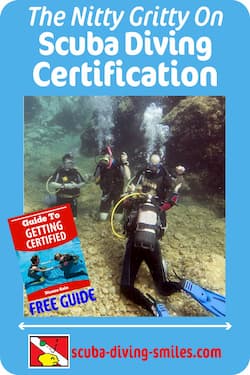

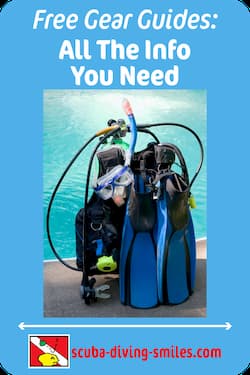

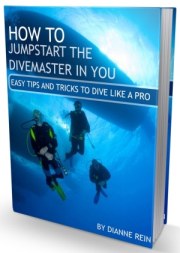

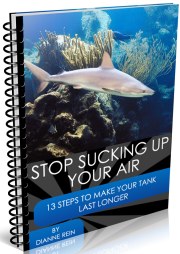
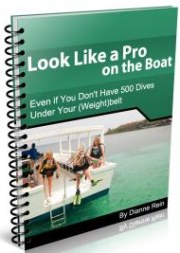
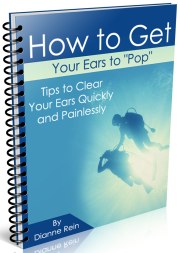
New! Comments
Have your say about what you just read! Leave me a comment in the box below.